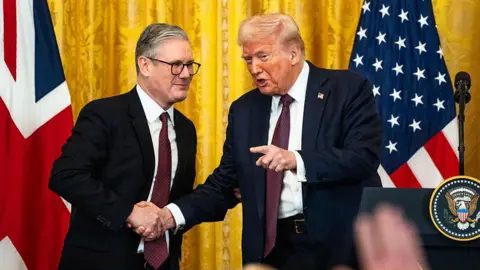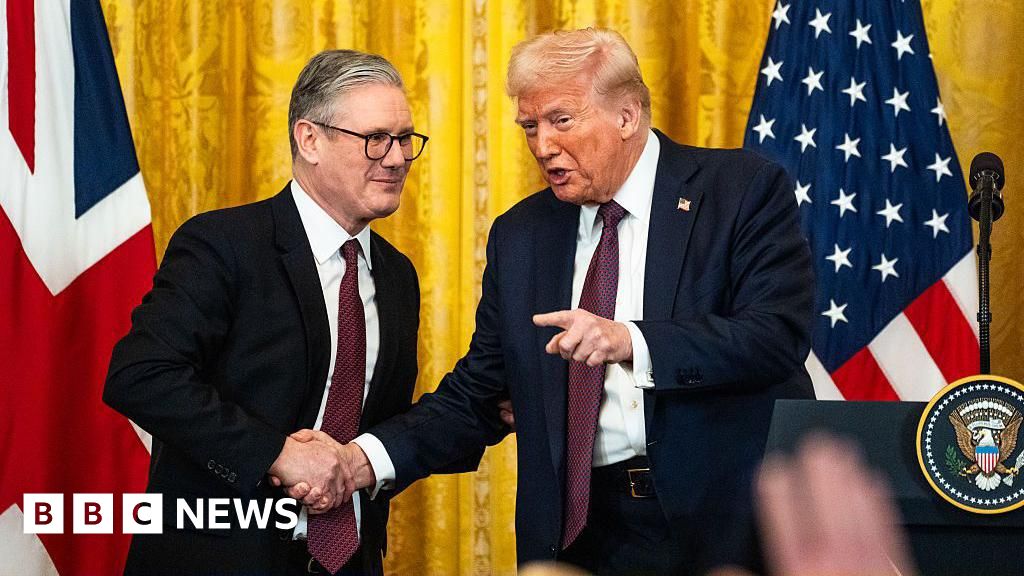Business reporter, BBC News
 Getty Images
Getty ImagesThe UK has avoided an immediate impact from US President Donald Trump’s directive to double tariffs on steel and aluminium from 25% to 50%.
This executive order raises import taxes for US companies sourcing metals from other nations starting Wednesday, but the UK retains a 25% tariff.
However, if the recent agreement with the Trump administration, aimed at eliminating these tariffs, doesn’t materialize, the UK may face the higher rate.
Currently, UK steel entering the US is tariffed, but the UK government is eager to expedite the implementation of the agreement to eliminate them “as soon as possible”.
A government spokesperson emphasized their “commitment to safeguarding British businesses and jobs,” while the Conservatives characterized the order as a “new tariff headache,” accusing Labour of leaving “businesses in uncertainty”.
Trump mentioned in the order that the UK warranted “special consideration” due to the US-UK Economic Prosperity Deal (EPD) finalized on May 8, 2025.
However, he noted that the US could raise the tariffs on the UK “on or after July 9, 2025,” if the UK is determined not to comply with relevant aspects of the EPD.
Tracing the Events
- 10 February: Trump implements a 25% tariff on all steel and aluminium imports to the US, effective from 12 March
- 2 April: Trump declares that most countries, including the UK, will incur a 10% “baseline” tariff on all goods headed to the US
- 8 May: The UK and US agree to lessen or eliminate specific tariffs
- 4 June: The US escalates import tariffs for steel and aluminium to 50%, while the UK still holds a 25% rate
The UK exemption in the executive order follows a meeting between Business Secretary Jonathan Reynolds and US Trade Representative Jamieson Greer in Paris on Tuesday.
Recently, the US and UK negotiated a deal aimed at reducing tariffs on certain goods, which includes eliminating tariffs on UK steel and aluminium entirely and lowering import taxes on cars to 10%. This agreement is yet to be activated.
The US holds the title of the largest steel importer globally, after the European Union, sourcing most of its steel from Canada, Brazil, Mexico, and South Korea, per US government data.
For the UK, the US is the destination for about 7% of its steel exports, valued at over £400 million, implying significant implications for the industry.
The UK also has providers of specialized steel products that primarily service clients across the Atlantic.
Ambiguity and Concern
Gareth Stace, CEO of UK Steel, described the last few months as a “rollercoaster of uncertainty,” but indicated that the industry can “breathe a temporary sigh of relief” with tariffs remaining at 25% instead of escalating to 50%.
He expressed the desire for the prompt removal of tariffs as agreed upon by the US and UK in May.
“We hope that deal materializes soon,” he added.
Rowan Crozier, the CEO of metal-stamping company Brandauer in Birmingham, noted that the exemption would mean UK firms do not face the same import tariffs as global competitors, but stressed that “widespread” uncertainty remains the “most detrimental factor.”
“The Trump administration continues to foster confusion, likely in hopes of crafting a deal,” he stated on the BBC’s Today programme. “Essentially, our clients are less confident in planning ahead or in placing orders.”.
However, he remarked that as a specialized manufacturing business, his US clients have little choice but to accept the tariffs for the time being.
President Trump has introduced tariffs on numerous countries since his return to office as a strategy to promote American-made goods.
Tariffs are fees imposed on businesses that import foreign goods.
Trump’s intention is to enhance US manufacturing and employment, although many economists caution that this could lead to greater consumer prices.
Alan Auerbach, director of tax policy and public finance at the University of California, warned that an increase in US steel production “will not occur overnight.”
“In the immediate term, buyers will simply have to pay higher prices for steel sourced from abroad,” he noted.
Although US production may eventually rise, the ambiguity surrounding future tariffs “hinders the objective of increasing US production,” Auerbach continued, emphasizing that companies need clarity to make investment choices.
Shadow business secretary Andrew Griffith criticized: “Labour’s mismanaged negotiations have left businesses in a state of uncertainty, and this country cannot afford this ongoing failure.”


